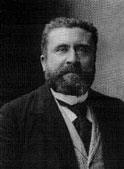Jean Jaurès 1914

Source: L'Humanité, August 1, 1914;
Translated: for marxists.org by Mitch Abidor.
How did this horrible thing occur? It must be recounted. The horrific scene must be fixed for history.
Jaurès had gone to the newspaper’s offices shortly before 8:00. He was coming from the ministry of foreign affairs where, delegated by the Socialist group, he had seen M. René Viviani. Renaudel and Longuet accompanied him.
He spoke briefly with our administrator Philippe Landrieu and some of our friends. He hadn’t had dinner and had much work to do.
“Let’s go eat,” one of us said.
“Let’s eat.”
We went to the restaurant Le Croissant, two steps from L'Humanité, and we sat at a table to the left of the entrance. Landrieu was seated to Jaurès’s right, Renaudel to his left. Also seated at the tragic table were Citizen Poisson, Amedée Dunois, Duc-Quercy, Daniel Renoult and his brother André, Georges Weil, Maurice Bertre, and Jean Longuet. The gravity of the moment moved us profoundly. Not far from us, at another table, Citizen Dolié, of Le Bonnet Rouge, was dining with his young wife.
Le Croissant is a busy establishment. People entered and left and we didn’t pay anyone any mind. Citoyenne Poisson remarked that, as always, Jaurès was a subject of curiosity.
Jaurès was speaking in his beautiful, deep voice. He was giving instructions to his political collaborators, to Dunois and Daniel Renault. Jaurès’s instructions! One had to have heard them to know with how caressing a voice Jaurès gave his instructions.
We finished eating. At that moment Citizen Dolié stood up and came over to us, a color photo in his hand. He held it out to Landrieu, saying:
“Look, this is my little girl”
“Can I see it?"Jaurès asked with a kind smile.
He took the photograph, examined it, asked how old she was, and complimented the young father.
It was 9:40.
Suddenly – horrible memory! Two shots rang out, a flash of light shone, and the frightening cry of a woman: “Jaurès was killed! Jaurès was killed!”
Jaurès fell like a sledgehammer to his left; people in the restaurant were standing, shouting, gesticulating, rushing around. It was a moment of confusion and shock. While some of us ran into the street, for the two shots were fired from outside, point blank through the open window Jaurès was sitting against, the victim was laid out on the banquette. He was hardly breathing and his eyes were closed. Was he aware of the crime? We'll never know. He didn’t die immediately. While waiting for the doctor a diner, by profession a pharmacist, felt the dying man’s pulse and shook his head. His shirt was opened and his heart was hardly beating. The body was placed on a table. Compère-Morel, who had come running in, sobbing, held the inert hand. Renaudel soaked up with napkins the blood coming out of the wound, a tiny red hole in the back of the skull with a small amount of white matter around it.
“Messieurs,” said the doctor, who had just arrived, “I fear there’s nothing to be done.”
Sobs issued from tightened throats. Nothing to be done? Is it possible that there’s nothing to be done? Is it possible that this great life has been shattered, cut off forever?
Three more minutes passed.
“Messieurs,” said the doctor, “M. Jaurès is dead.”
The sobbing grew louder. All present removed their hats in a salute to the man who had just expired.
And one if us said: “Despite it all, we have to put out the paper. It has to come out on time, as if he was still here.”
Source: L'Humanité. August 1, 1914;
Translated: for marxists.org by Mitch Abidor.
Jaurès is dead. He was killed before our eyes by two death-dealing bullets.
At the very moment he was mortally wounded he was discussing with us the grave events that are leading Europe to a catastrophe unprecedented in its history. He sought to forestall this horrible, this terrifying peril. He told us how with a virile and lucid effort the French government could still save France and Europe from a universal cataclysm.
Now he is dead. His great voice will never again resound in our ears. His luminous intelligence willnever again attempt to pierce the secret of events in order to save humanity and the proletariat from the dangers that lay in wait for them. No longer will his will be applied to guiding the proletariat of his country and the world down the road to the future.
Our bereavement is not just the bereavement of workers and socialists. It is the bereavement of all man of upright consciousness who, through the fears and darkness of the present, are leading all the world’s peoples towards a future of reconciliation and concord.
And so, through a terrible irony of fate he has left us at a moment when his presence was most indispensable to the party to which he had dedicated all his intelligence and all his heart, and, beyond this party, to France and the world.
Should we despair?
No. What must be learned from this noble life that has just been so tragically extinguished is a lesson in action, a lesson in courage. He nobly carried out his task.Let us remain worthy of him by fulfilling ours, each of us in keeping with his intelligence and strength.
With him a soldier of civilization and humanity has fallen at his post of combat and honor, but humanity and civilization remain. This is what our great departed would cry out if he was still able to speak.